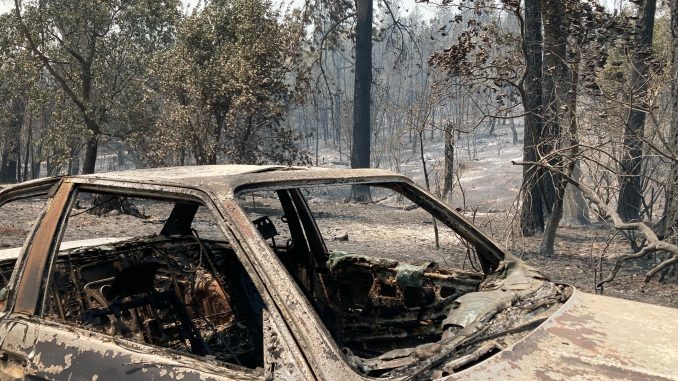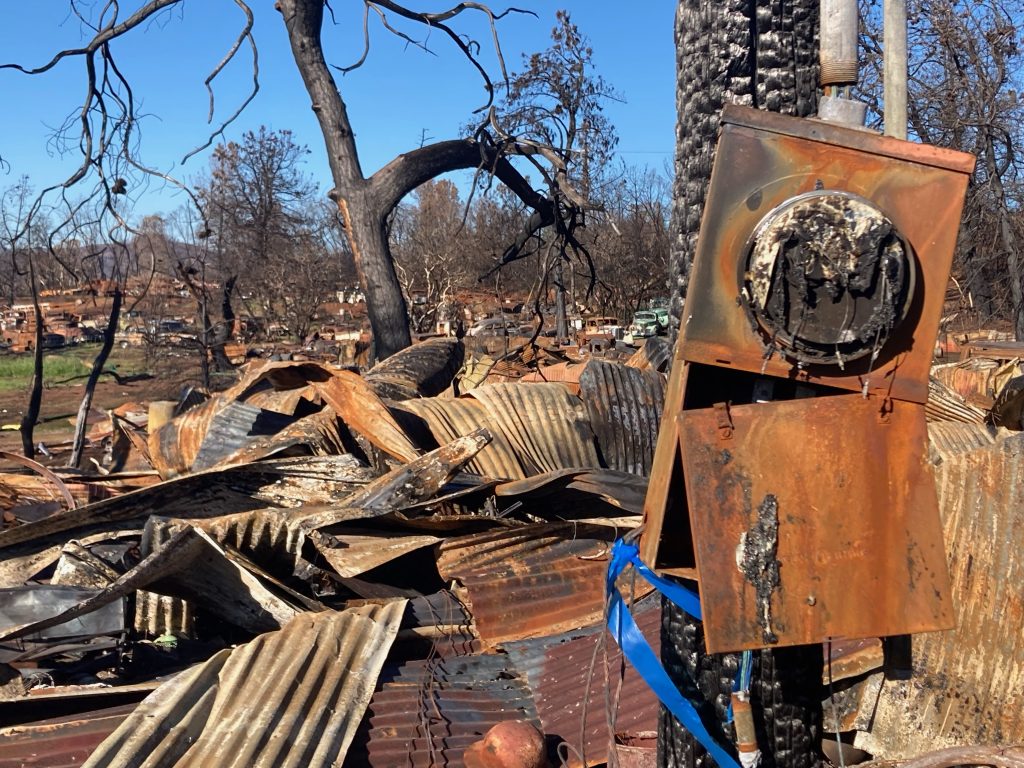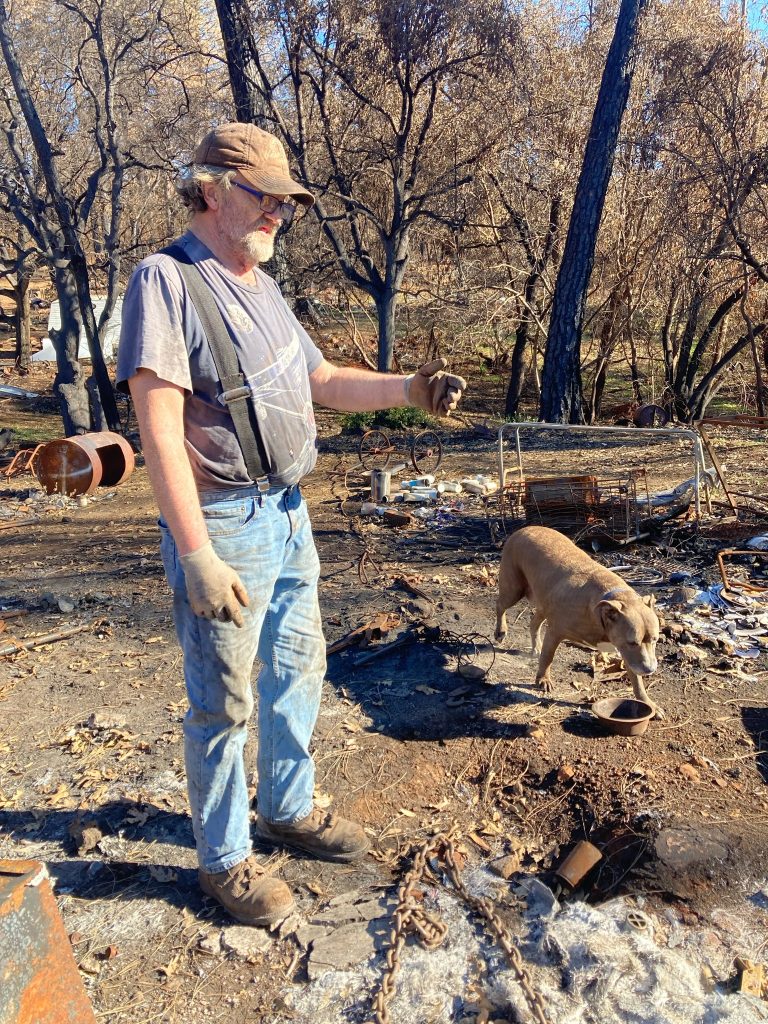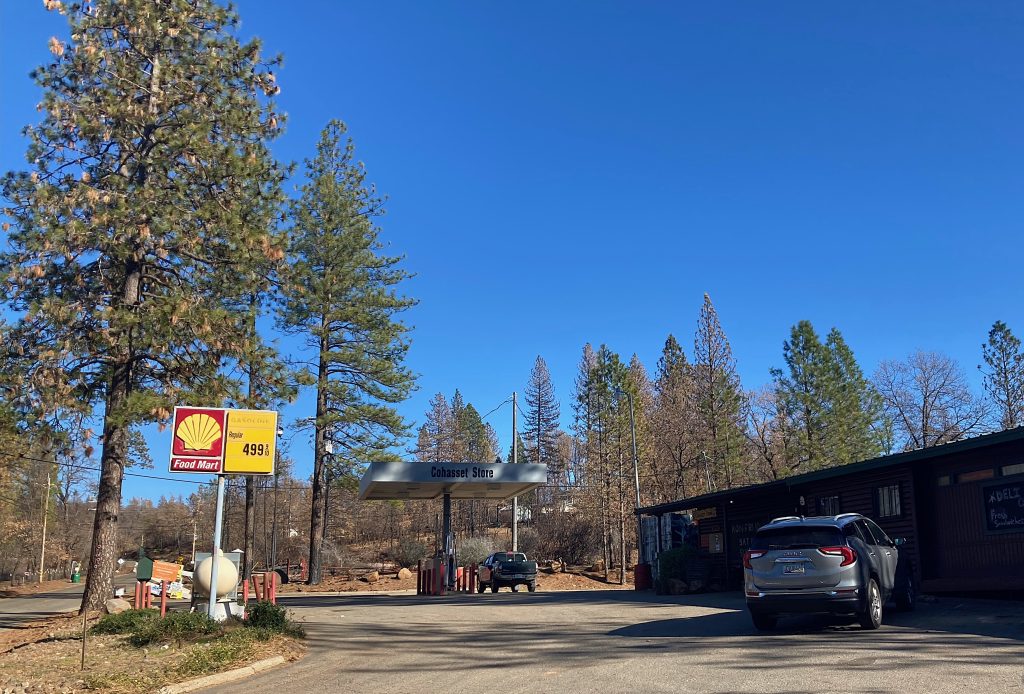
One man’s effort to recover six months after Park Fire
By Ken Magri
“No time to grieve for roses when the forests are burning.”
–Polish poet Zbigniew Herbert
Wildfires plague our state with such frequency now that we have arrived at the point where a new catastrophic fire quickly overshadows the previous one. It leaves little time to grieve as Californians grow numb by watching these tragic events repeat themselves.
January 24 marks six months since the Park Fire raged through Butte and Tehama counties, burning 430,000 acres and destroying over 700 structures during its 64-day run. While no deaths or significant injuries were reported, the fire dramatically changed the lives of every person caught within its path.
Many of the Park Fire’s earliest victims lived in Cohasset, a tiny mountain town of under 350 residents nestled into Butte County’s northern-most forest lands. The fire destroyed 134 structures, which is just over 50% of the town.
But while Cohasset was badly damaged, it was not destroyed.
On July 31, my photographer Dave Marquis and I were covering the story for the News & Review when we met Cohasset resident Brian Bowles, a 62-year-old Chico native, and his dog, Diamond. They were camping next to Highway 99 in the parking lot at the Neighborhood Church of Chico’s evacuation center. Bowles told us about the dramatic trip that he and Diamond made to escape the approaching fire.
How the Park Fire raged through Cohasset

The fire began at 2:44 on July 24th at the end of Upper Bidwell Park, when two 911 calls reported a burning car at Alligator Hole. Driven by winds of up to 25-mph, it quickly burned 500 acres by 5 pm, continuing to move north-northeast along Cohasset Ridge.
By 8 pm Cohasset residents were told to evacuate. Some folks had to communicate the news to their neighbors by driving to their homes and pounding on doors.
But burning trees along Cohasset Road threatened to block the only escape route. To provide another way out, Sierra Pacific Industries unlocked the gates to its private logging roads, leading 200 to 250 residents across their property and over to Highway 32. In the following four hours, two separate car caravans made successful evacuations out of Cohasset.
Bowles and Diamond were among the last to leave, just as the flames were crossing Jack Rabbit Flat. On his way out, Bowles spotted two neighbors whose car ran out of gas. He pulled over and hooked a chain to the couple’s bumper, towing them to all the way into Chico.
That evening, a wall of fire blazed through the little town while firefighters, including the crew from Cohasset Fire Station #22, redirected its path around the town’s historic cemetery, a local church and the Maple Creek Ranch where advance fire mitigation efforts paid off.
Back in July, Bowles had asked us to check on his place and message him if anything survived, especially his Harley-Davidson. We had the sad duty of informing him about the burn-through that destroyed his residence and burned the tires and electrical wiring off his motorcycle.
The Federal Emergency Management Agency, or FEMA, provided support for the initial firefighting effort. But because the damage amount did not reach a federally mandated threshold of $75 million, FEMA could offer nothing for uninsured individuals in the aftermath.
Over the months we stayed in touch with Bowles, learning about his efforts to recover. He now stays up the road at a friend’s house. He agreed to meet us over at his property as long as we could help push start his Kia afterwards, because it has a dead battery.
The drive back six months later

When we visited Cohasset last July, the area was mired in black and gray. Smoldering tree stumps punctuated the ashen landscape and an eerie sense of quiet hung in the smoke-filled air.
But our return six months later was sunny, almost balmy, as we drove up Cohasset Road. The sky was blue, birds were singing and the scenery changed into more brown and green coloration.
But something else was different; the smell. That off-gassing aroma of burnt fire material anyone can still smell when walking past Bidwell Mansion, that smell was gone.
We talked with the Cohasset Store’s co-owner Lama Hanoun, who said they don’t see many of their old customers because most have moved away. Right now, the store gets steady business from the work crews hired for logging and state-mandated debris removal, but that will end at some point.
“Do you know Brian Bowles?” we asked while showing Hanoun a photo.
“Oh yes, I recognize him,” Hanoun answered. She said the store allows Bowles to occasionally buy small amounts of gas or food on credit. “He always pays us back when he can.”
Outside the store, trucks hauling logs and fire debris passed by every few minutes. The Butte County originally set a January 15 deadline for Right of Entry, or ROE, forms to be completed; but extended it to March 15. Those ROE forms allow contractors to bring in heavy equipment and clean up fire-ravaged debris at no charge to the landowner.
Passing by the corner of Cohasset and Vilas Roads, a huge removal effort was underway. Twisted sections of sheet metal and old vehicles filled the site with a distinct color of rust.
Upon arriving at Bowles’ five-acre property, we spotted him down in a ravine salvaging catalytic converters from his old cars. His ever-present companion Diamond charged up the hill to greet us, joyfully spinning around with saliva flying everywhere.
As Bowles continued to work we asked if he received any recovery assistance.
“There was the Red Cross, they gave us some money,” he said. “There was this realtor outfit that gave a little money. There was another [charity] and I filled out their form and got a $500 cash card in the mail.”
At a friend’s suggestion, he created a Go-Fund-Me page for his motorcycle, hoping that Harley-Davidson enthusiasts might have sympathy for the damaged 1998 Dyna Wide Glide. That page his here.
But to date Bowles has received just $105 in Go-Fund-Me contributions. He estimates that he was given less than $5,000 in total assistance. But he can still salvage metal to earn a bit more. Before the fire Bowles estimated that he earned $300 to $400 a month. “You don’t need a lot to survive,” he said.
Now, he is hoping that upcoming Social Security payments scheduled to begin in April will carry him through.

“My saving grace up here has been the Cohasset Store owners,” Bowles noted. “I am able to get a little credit when I need it.”
Bowles doesn’t have a refrigerator where he lives now, so the store owners keep his pre-paid milk in their cold box for him.
Bowles’ brand of homespun philosophy serves as a metaphor for all of the Park Fire victims in Cohasset, where neighbors don’t have much, but will pull together in a crisis to help one another.
“I can get by – I plan to stay,” said Bowles. “I‘ve got a buddy who has a single-wide mobile home. It needs a little TLC but it’s not falling apart and I can get it for $500.”
Working quickly to salvage as much metal as he can, Bowles only recently completed his own ROE form to have hazardous trees removed and the property officially cleaned up.
“This place came with a quote from Einstein that said ‘Imagination is more important than knowledge,’” Bowles recalled.
So we asked him to imagine what this burned and broken property, which he owns outright, might look like in five years.
“Cleaner, with less trees around it,” he answered before pointing to a low spot on the property. “If I can get use of a tractor I plan to put in a little dam right in there. I want it that, if this happens again, I can fire up a gas-powered pump, suck out the water and save the place.”
As the sun’s shadows got longer, we patted Diamond on the head and said goodbye to Bowles. He had parked his Kia on an incline, so he wouldn’t need a push this time.
Journalists often share people’s tragic experiences while knowing they will probably never see them again. “Journalistic objectivity” is a professional term that reminds reporters to detach themselves from the emotional nature of a traumatic story.
So perhaps it was our absence of professionalism that had us stopping in again at the Cohasset Store on our way out of town to pay off Bowles’ modest $20 gasoline bill and leave the Hanouns an additional $30 for his future milk purchases.

thanks Ken good story I liked it.
Wonderful story and photos!!!
The Cohasset Historical Society has been sharing Park Fire stories for several weeks now on substack – https://tellyourparkfirestory.substack.com/
The impact of a disaster is understood so much better when read the personal experiences of the victims. Thank you.
Thank you for sharing this resident’s story however I would like to point out some facts you have in the beginning that are in correct. Our town has way more than 350 residents. We also were only given about 15 minutes to evacuate and that was at 6:05 pm.
Just 2 corrections ! It was a local man “Justin Autry” that led everyone out the back way it was not sierra pacific or blm. Also, FEMA did not help anyone in Cohasset !
Although your story shines a light on our disaster it also points out that Cohasset has ONE road out of the area that is paved. There used to be 3 but the county and CalFire (formerly CDF) dropped the ball on Ponderosa Was which was Cohasset’s exit to Forest Ranch. They quit maintaining that road and it was eventually gated with no opposition from our Supervisors. That way out was lost. Sierra Pacific closed off ALL of their logging roads which offered another access out of Cohasset. To the dismay of our community we lost that route to safety also with no protest from our authorities over another lost access for Cohasset.
During the fire it was a man named Justin Autrey who led over 80 car loads of people through Sierra Pacific Industries gates…he cut the locks. Your article stated it was S.P. who opened the gates…not true. That man saved lives of countless people who were trapped behind the fire lines when they closed the only road out of the area, the Cohasset Rd., due to the fire burning over it.
If you want to write a story about a local hero, Justin Autrey is his name. He stepped up in the face of disaster, risking his own life, to save the lives of so many running from this monster fire. He is the real story here amongst all the others.
Thank you for writing this. I, too, am one of the survivors of this disaster. I lost everything of 45 years on that mountain.